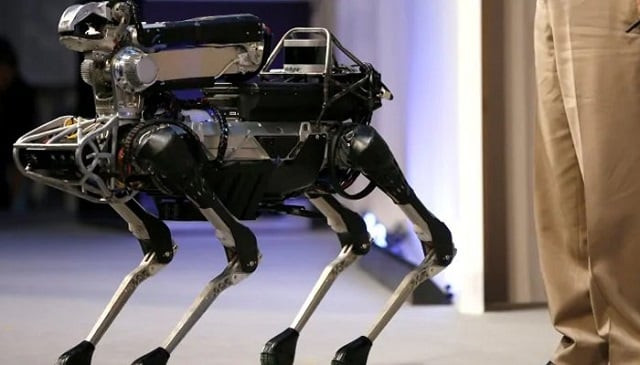Robots 'not evil' says Boston Dynamics as humanoids go viral
The humanoids' uncanny abilities have also sparked worries that they could become a threat to humans

PHOTO: REUTERS
Not so, says their creator Marc Raibert in an interview with AFP at the Lisbon Web Summit, claiming that the Spot robots aren't evil and won't be turned into weapons.
The first 1,000 Spot models are to be shipped to customers by the summer of 2020.
US engineering and robotics firm Boston Dynamics, founded in 1992, was in 2013 bought by Google, which sold the firm on to Japan's Softbank in 2017.
"So far the kind of people we're shipping to and working with are developing applications in construction. It's a popular goal in construction these days to collect data to measure the progress of the construction site," Raibert said.
From rundown Badin school to robots in Sweden
"We're taking some of those same sensors, and putting them on the robot and having it travel and collect data. There's a real opportunity to have robots do that on a more routine basis. The robots can localise the sensors much more precisely than people can.
"Another area that we're working in, we call it gas and oil, but it's really any facility that needs to be monitored. We're doing a little bit of work with what we call public safety.
Police going to a hazmat hazardous environment situation or bomb threat or just something where there's an unknown package and rather than have a human going to poke at it they're using the robots to poke at it."
Raibert explained that robots "can see people as obstacles and avoid obstacles. But they're really not designed to work closely with people. We're not selling these to people who put them in their homes.
"Even in offices, there's only limited use. We want everything to be safe. I think some of the fear of robots that does exist is not that the robot will make a mistake and bump into something, you know, that's gonna happen sometimes.
Like car accidents, right? There's another fear, which is more a science fiction fear that the robots are going to be so smart that they'll be angry with us. I don't think it's realistic in today's robots.
"Hollywood has taken things to an extreme place, in what they portray. The robots are not evil, they don't have emotions or egos or ambition like people do. Our current license agreement for Spot says that you're not allowed to use the robot to harm a person or to intimidate a person. We don't want anybody to weaponise them."
Scientists puzzled by really big planet orbiting really little star
Raibert said Spot has a horizon. "I won't tell you what it is, but it's a reasonable horizon. It's not a ridiculous horizon. We have a business plan for going into the black, but it's a few years out. So today it's Spot. We're already shipping it.
"The next thing is a logistics robot. We're working on one called Handle, which is designed to work in warehouses, moving boxes around. It looks like a bird. I think that that is going to be a bigger scale activity, but much narrower focus than Spot.
"And then the future is things like Atlas. I don't think Atlas will ever be shipped. But what we learned on Atlas will make its way into the other product things eventually.
"Although we make robots to sell, I think our long-term interest is in understanding how it is that people and animals can move in the world with such mobility and dexterity. That's a grand challenge, a scientific challenge."


















COMMENTS
Comments are moderated and generally will be posted if they are on-topic and not abusive.
For more information, please see our Comments FAQ